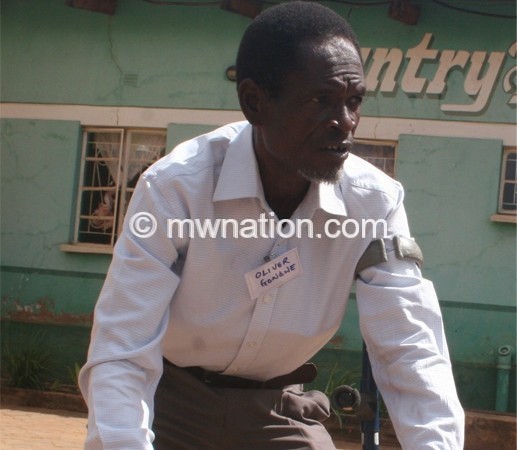Disability inclusion in sanitation
The name Linthipe evokes memories of broken dreams through accidents. Many people testify how the accident-prone area in Dedza has sent to the grave unfulfilled dreams of their relatives and loved ones.
For those who survived accidents at such a life-threatening slope, sad stories of post-accident trauma, that leave some of them disabled for life, are told.
Fifty-eight-year-old Gondwe, a former Malawi Defence Forces (MDF) soldier tells of how he fails to answer nature’s call in a pit latrine every time he visits Bolero, his village in Rumphi.

He cannot squat. As such, he does not bother to go to the pit latrine whenever he is in the village. This is due to an accident on June 28 1998 that left him disabled for the remaining part of his life.
“The car we were travelling in overturned three times after hitting a tree. The driver died on the spot, but I survived,” he says.
“I was rushed to Queen Elizabeth Central Hospital [in Blantyre] for treatment where I spent seven months. It was discovered that my backbone was affected so much and my leg had a fracture such that my right leg was 11 kilogrammes against seven of my left leg.
“This condition needed specialised treatment, and the army flew me to One Military Hospital in South Africa for treatment,” narrates Gondwe.
He now uses clutches and a raised shoe because one leg is shorter by five centimetres.
“They [doctors] also planted a kernel on my hip to aid me in raising my leg, but this prevents me from squatting,” he says.
Due to the accident, Gondwe retired from the military and is now based at Rumphi Boma. At his home, he has a pit latrine with a seat to prevent him from squatting.
But, whenever he visits his village and numerous other public places, he is forced not to use ‘the gents’ due to unfriendly pit latrines for the disabled.
His case confirms a qualitative baseline survey the University of Malawi (Unima) conducted in Rumphi. The study reveals that people with disabilities in the district are excluded on issues of water and sanitation.
Following the study, the London School of Hygiene and Tropical Medicine in partnership with Mzuzu University’s Centre for Excellence in Water and Sanitation, the Development Department of the CCAP Synod of Livingstonia and Unima’s Centre for Social Research have embarked on a project called Disability Inclusion in Community Lead Total Sanitation (CLTS) in the district.
The project seeks to improve access to sanitation for all in the development of the country just as a researcher at the Loughborough University in the UK, Hazel Jones, argues: “If we can improve the design of the facilities to be inclusive of the disabled then pregnant women, the critically ill and the elderly will also benefit.”
However, as an expert in disability issues at Mzuzu University, Dr Ambumulire Phiri observes, the disabled in the country are sidelined on issues of water and sanitation because the country’s laws ‘do not spell out how such issues are to be governed’.
Says Phiri: “Access to water and sanitation is a right issue. But the Disability Act of 2012 does not promote inclusion of the disabled into water and sanitation issues.
“If the disabled are excluded in such issues, we are violating their rights. We need policies or laws that would govern various institutions to make sure that sanitary facilities are user friendly for the disabled.”
Mzuni’s centre manager Rochelle Holm said a qualitative survey done by the Unima in the district established that people with disability do not have access to sanitation facilities that are specifically designed for them.
She said as such, the project has conducted trainings with community workers and government officials to make sure that facilities that will be constructed are designed to accommodate the disabled.
Minister of Gender, Children, Disability and Social Welfare Patricia Kaliati, however, said government’s policy on mainstreaming and inclusion addresses all issues that concern those with or without disability.
“It does not have to talk about sanitation in specific. Any programme that the country has is supposed to include the disabled. That is why we talk of inclusion of the disabled into various programmes, including designs of infrastructure,” she said.
She said what is needed is for government to intensify on awareness so that people are able to understand the importance of inclusion of the disabled into various programmes.





